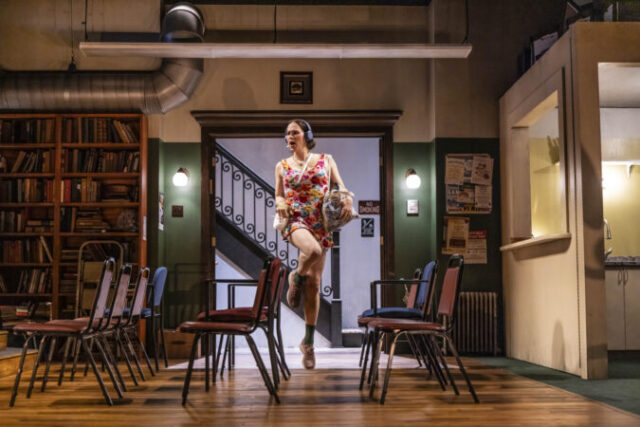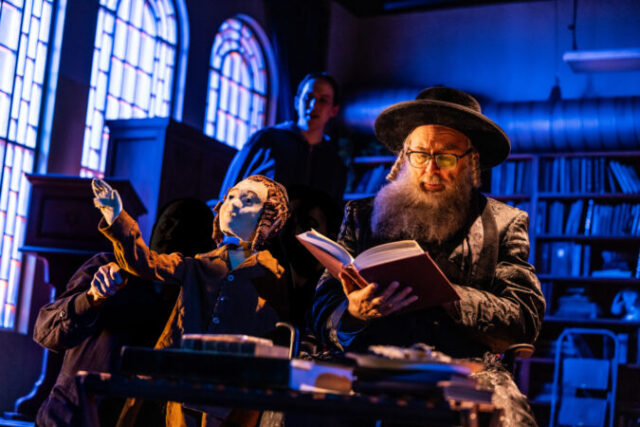
Tommy Dorfman stars as a trans rabbi trying to come out to her father in Becoming Eve (photo by Matthew Murphy)
BECOMING EVE
Abrons Arts Center Playhouse Theater
466 Grand St. at Pitt St.
Through April 27, $29.88-$130
212-598-0400
www.nytw.org
www.abronsartscenter.org
On the second day of Rosh Hashanah, the Jewish New Year, synagogues around the world read and discuss Genesis 22:1–24, the story of Abraham’s binding of his son Isaac on Mount Sinai, preparing him as a human sacrifice until an angel of G-d intervenes, replacing Isaac with a ram at the last moment. Known as the Akedah, the passage has been hotly debated for millennia by religious leaders, scholars, and laypeople, exploring issues of faith, obedience, familial responsibility, and the value of human life.
One line of thought considers whether Abraham, and perhaps Isaac as well, is aware that it is a test and that Abraham believed that G-d never planned on having him go ahead with the slaughter of the son who was born to him and his wife Sarah in their old age.
In Emil Weinstein’s debut play, the searing Becoming Eve, another interpretation comes to the fore: whether what happened on Mount Sinai was actually a transformation of Isaac’s soul from female to male, as argued by Rabbi Yechiel Michel of Zloczow in the seventeenth century.
Based on Abby Chava Stein’s 2019 memoir, Becoming Eve: My Journey from Ultra-Orthodox Rabbi to Transgender Woman, the lightly fictionalized play, continuing at Abrons Arts Center through April 27, focuses on Chava (Tommy Dorfman), a trans rabbi who has not come out yet to her deeply religious family, whose ancestors include the Baal Shem Tov, the eighteenth-century founder of Hasidism.
Chava has been spotted wearing a dress in midtown Manhattan by a member of her parents’ tight-knit Williamsburg community, and, fearing that the observer will reveal her secret, she decides to tell her father, Tati (Richard Schiff), and mother, Mami (Judy Kuhn), enlisting the support of Jonah (Brandon Uranowitz), a rabbi who has recently started a progressive shul on the Upper West Side.
Chava is afraid her parents won’t understand, explaining to Jonah, “They live in a hermetically sealed nineteenth-century village that happens to be in Brooklyn. They don’t know the Internet. They don’t know Superman.”
Jonah is excited to learn of Reb. Michela’s interpretation, proclaiming, “That story has always confounded me. This essential paradox, at the very start of our religion, G-d telling Abraham to sacrifice Isaac, his beloved son, when G-d has just promised Abraham that Isaac will father generations! How can both be true? But the whole story is about both-ness, right? This essential both-ness that Abraham has to contend with. But it makes so much sense with the Michela commentary. It cracks the whole thing open. The sacrifice is actually a transformation, which is so essentially Jewish. We’re the people of transition. Of exodus, of leaving and starting over, of walking through doorways. And doorways are fundamentally about liminality, right? The in-between space between two extremes! Between borders and genders and sexualities and — This may have cracked open my Rosh Hashanah speech.”

Tati (Richard Schiff) reads Scripture next to a puppet of his son in powerful new play (photo by Matthew Murphy)
Chava is disappointed when only Tati shows up, and she hesitates in sharing her truth. As she delays, the narrative shifts back and forth between the present and the past, depicted in poignant memory scenes from Chava’s childhood in which she is portrayed by a series of Bunraku-style puppets that get bigger and older as Chava does; they’re operated by Justin Perkins and Emma Wiseman, dressed in all black, with Dorfman standing with them, speaking the dialogue in darkness.
The vignettes begin with Chava at the age of two and a half, when Tati, thrilled to finally have a son after five daughters, wants to bring his boy to shul for the first time and Mami disagrees. At six, Chava is asking Tati whether doctors will someday be able to perform full-body transplants. At thirteen, Chava is taught by Tati how to put on tefillin; he explains, “The tefillin binds us, father and son, together to the end of time,” recalling the Akedah. At sixteen, Chava grows close with a curious schoolmate, Chesky (Rad Pereira). And at nineteen, Chava is introduced to Fraidy (Tedra Millan), who has been chosen to be his bride.
Meanwhile, in the present day, Chava, Jonah, and Tati have intriguing conversations about family and the Torah. Tati is confused when Jonah offers, “I left Judaism completely for a few years, actually, and then I found my way back, through transdenominational Renewal Judaism, which takes a lot of inspiration from the Hasidic masters.” Tati doesn’t understand why Chava is refusing to attend her brother’s upcoming wedding. When Jonah mentions that Steven Spielberg helped fund the local Yiddish Book Center, Tati claims to have never heard of him. Chava reminds her father that, as a teenager, he had snuck out of his house to see Jaws, an event that he is ashamed of. “You looked America in the teeth and it scared you back to Williamsburg,” Chava says. Tati replies, “I wasn’t scared. It was clearly a machine.” Jonah adds, “Machines can be scary,” to which Tati concludes, “Only if you let them run your life,” a clever reference to biblical fundamentalists like Tati.
Presented by New York Theatre Workshop, Becoming Eve was initially scheduled for the Connelly Theater but had to be moved after the New York Archdiocese, which runs the venue, canceled the show because of its content. Archdiocese director of communications Joseph Zwilling wrote in a statement, “It is the standard practice of the archdiocese that nothing should take place on Church-owned property that is contrary to the teaching of the Church. That applies to plays, television shows, or movies being shot, music videos being recorded, or other performances.” The Connelly is part of the Cornelia Connelly Center, a nonprofit whose mission is “to champion girls, empowering them to realize their full potential from middle school through college and beyond.”

Tony winner Brandon Uranowitz plays an Upper West Side rabbi in Becoming Eve (photo by Matthew Murphy)
The play, which is in English but the characters are actually speaking in Yiddish and Hebrew, feels much more at home at Abrons Arts Center on the Lower East Side, where immigrant Jewish communities have thrived for more than a century. Abrons is part of the Henry Street Settlement, which was established in the late-nineteenth century and whose mission is “to open doors of opportunity for Lower East Side residents and other New Yorkers through social service, arts, and health care programs.”
To signal time shifts, Ben Stanton’s lighting goes dark and UptownWorks’ (Daniela Hart, Noel Nichols, Bailey Trieweiler) sound explodes before Daniel Kluger’s music calms things down. The convincing puppets are by Amanda Villalobos, who has previously worked on such shows as Is This a Room, Wolf Play, and The Old Country.
Becoming Eve unfolds on Arnulfo Maldonado’s exquisitely detailed set, an upstairs office with overstuffed bookcases, a small kitchen, a flyer for a production of The Hamantaschen Monologues, exposed air ducts, Jonah’s cluttered desk, a cabinet with two Torah scrolls, a bemah, and three arched windows. Enver Chakartash’s costumes range from Chava’s sexy dress to Jonah’s casual clothing to Tati’s traditional Hasidic garb.
Weinstein, a trans man who, as a teenager, attended the synagogue that Stein had left, writes incisive dialogue that avoids becoming, well, preachy and didactic, with unexpected twists and turns that are guided with expert precision by director Tyne Rafaeli (Epiphany, The Coast Starlight). Dorfman (Romeo + Juliet, “Daddy”) is heartbreaking as Chava, who is desperate to be accepted by her family; it is wrenching when she changes from her revealing dress to a zipped-up hoodie, terrified at how her father might react. Unrecognizable Emmy winner Schiff (Glengarry Glen Ross, The West Wing) is sensational as the long-bearded Tati, a respectable man stuck in the past, unwilling to face the realities of the modern era.
Tony winner Uranowitz (Falsettos, An American in Paris) is eminently likable as Jonah, a rabbi who understands just how to bridge the gap between Chava and Tati. Three-time Tony nominee Kuhn (Fun Home, Les Misérables) and Millan (On the Shore of the Wide World, The Wolves) excel as the key women in Chava’s life, while Pereira (Take Care, Madonna col Bambino) is touching as Chesky.
One of the best plays of the year, Becoming Eve begins with Chava singing Ariana Grande’s “Break Free,” which includes the lyrics “If you want it, take it / I should have said it before / Tried to hide it, fake it / I can’t pretend anymore,” and ends with SOPHIE’s “Immaterial” (“Im-ma-ma-material, immaterial / Immaterial boys, immaterial girls / Im-ma-ma-material, immaterial / We’re just, im-ma-ma-material [I could be anything I want] / Immaterial, immaterial boys [anyhow, anywhere] / Immaterial girls [any place, anyone that I want] / Im-ma-ma-material, immaterial”).
In Genesis 22:1, G-d calls out to Abraham, who answers, “Hineni” — “Here I am” — which is also the name of one of the most beautiful Rosh Hashanah and Yom Kippur prayers, sung in the shul by the cantor, who is representing the congregation despite their own personal faults and transgressions. The final word of Weinstein’s play is also “hineni,” a defiant conclusion to a complex, thought-provoking work about who we are, how we are seen by others, and everything in between.
[Mark Rifkin is a Brooklyn-born, Manhattan-based writer and editor; you can follow him on Substack here.]